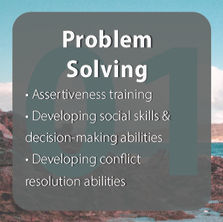

"Rational Emotive Behavior Therapy is a highly effective and evidence-based approach that helps individuals identify and challenge irrational beliefs, leading to improved emotional well-being and psychological functioning."American Psychological Association




Overview
Rational Emotive Behavior Therapy (REBT) is a form of psychotherapy developed by psychologist Albert Ellis. It is based on the belief that our emotions and behaviors are largely influenced by our irrational beliefs and thoughts. REBT aims to help individuals identify and change these irrational beliefs, leading to healthier emotional responses, adaptive behaviors, and improved mental well-being.
Process
How Does REBT Work?
Assessment: A therapist works with you to identify irrational beliefs and patterns of thinking that contribute to emotional distress and maladaptive behaviors.
Disputing Irrational Beliefs: A therapist helps you challenge and question irrational beliefs replacing them with more rational and adaptive thoughts.
Cognitive Restructuring: Through various techniques, such as cognitive restructuring and reframing, you learn to replace irrational beliefs with more rational and constructive ones.
Homework and Practice: Individuals are encouraged to practice and apply the newly acquired rational thinking and beliefs to their daily lives.
Integration and Maintenance: You learn to integrate the new rational beliefs into your overall belief system with continued practice.

Benefits
Physical Benefits
Indirectly, REBT can contribute to physical well-being by reducing stress and improving emotional regulation, which can have positive effects on overall physical health.
Mental Benefits
Improved emotional regulation and resilience
Enhanced self-esteem and self-acceptance
Reduced anxiety, depression, and other negative emotions
Increased problem-solving skills and adaptive coping strategies
Greater clarity of thinking and perspective-taking abilities
Social Benefits
Improved communication and interpersonal skills
Enhanced conflict resolution abilities
Healthier relationships and interactions with others
Increased empathy and understanding of others' perspectives
Medical Benefits
REBT can be used as a therapeutic intervention for various mental health conditions, including anxiety disorders, depression, substance abuse, phobias, and personality disorders.
It can also be effective in managing stress-related symptoms and improving overall psychological well-being.



Applications
Application and Uses of REBT
Individual therapy settings
Group therapy and support groups
Educational and counseling settings
Workplace stress management programs
Substance abuse treatment programs
FAQs
How long does REBT therapy typically last?
The duration of REBT therapy can vary depending on individual needs and goals. It can range from a few sessions to several months or more, depending on the complexity of the issues being addressed.
Is REBT suitable for everyone?
REBT can be beneficial for many individuals, but it may not be suitable for everyone. It's important to consult with a qualified therapist to determine if REBT is the right approach for your specific needs and circumstances.
Can REBT be combined with other therapeutic approaches?
Yes, REBT can be integrated with other therapeutic approaches depending on the individual's needs. It is often used in combination with cognitive-behavioral
Resources
Albert Ellis Institute: www.albertellis.org (information about REBT, training opportunities, and resources for professionals and the general public)
International Institute for Rational-Emotive Behavior Therapy: www.iirebt.org (information, training, and resources related to REBT)

Chateau Recovery
Our Mission
To empower & equip those who strive for hope, health, and a new mindset in recovery.
We believe in working with you and your support network to break free from the stigmas of addiction. We provide you with the help and resources to enjoy life-changing sobriety.
Our Approach
Chateau Recovery looks beyond just identifying and adjusting behaviors.
We explore the core reasons impacting your mindset, behaviors, and environment. We utilize evidence based therapies like the Arbinger Outward Mindset and Dharma Recovery.
Recent Blog Posts
















